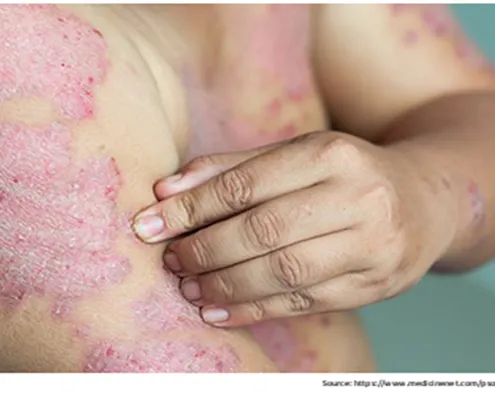Psoriasis is non-contagious and cannot spread from person to person. However, if left untreated, it has the potential to spread from one part of the body to another.
We know how distressing and embarrassing having psoriasis can be. If you have psoriasis, we can help you better manage your condition and regain your self-esteem. At Dr. Swetha’s Cosmoderm Centre, Dr. Swetha P offers highly effective tailored psoriasis treatment in Indiranagar, Bangalore.
According to Dr. Swetha P, a well-qualified and competent dermatologist in Indiranagar, Bangalore, knowing the facts about psoriasis can help combat the stigma associated with having a visible condition. And knowing a little more about psoriasis and its causes will help you find the answers you are looking for regarding managing your condition.
Here’s all you need to know about psoriasis and how it spreads.
Does psoriasis spread?
Psoriasis is an auto-immune skin disorder. Psoriasis flare-ups can be unpleasant and embarrassing, and patients may notice that others approach them strangely. People who have never seen psoriasis might believe it is contagious. On the other hand, Psoriasis is a non-contagious condition, and the scaly patches it produces do not spread.
On the other hand, Psoriasis frequently spreads from one area to another. This is because the immune system process that causes psoriasis can worsen, not because the diseased skin infects other body regions. A psoriasis rash can appear anywhere on the body, depending on the person’s type of psoriasis. Plaque psoriasis is the common form of psoriasis. It typically affects the scalp, external elbows, and knees, although it can impact any body part.
Another severe form of psoriasis, erythrodermic psoriasis, produces bright red spots all over the body. Patients with psoriasis that spreads faster and is severely red should visit a doctor right away since this type of psoriasis is rare and can be more harmful.
Some individuals with one type of psoriasis may develop inverse psoriasis, a distinct kind of psoriasis. It usually affects skin folds, such as the armpits.
What Causes Psoriasis?
Psoriasis is an autoimmune skin disease in which the body attacks itself. The exact cause of Psoriasis is still unknown. On the other hand, decades of research point to two major factors: the immune system and genetics. White blood cells destroy invading pathogens and infections in the human body. Psoriasis patients have an overproduction of skin cells due to this erroneous attack.
On the other hand, genetics play a fundamental role in Psoriasis. Some people inherit genes that make them more prone to developing this ailment. If you have a close relative who has Psoriasis, your chances of developing it are more.
Managing and Treating Psoriasis
According to Dr. Swetha P, a renowned skin specialist in Indiranagar, Bangalore, the best way to prevent psoriasis from spreading is to treat it. Treatment is often a trial-and-error process. A patient’s treatment requirements may change over time. What works for one patient may not work for another.
The following are some treatment options:
Lotions & Creams
Moisturizing the skin is essential for speeding up the healing process and preventing itchiness. Without a prescription, a variety of psoriasis-friendly moisturizing creams are available.
Tar shampoo and soap may also be beneficial. For example, salicylic acid can help minimize the appearance of flaky plaques by encouraging old skin cells to come off.
Steroid creams, such as hydrocortisone, are also safe and effective. They can aid with itching and speed up the healing process.
However, some of these lotions can be harsh on the skin, so seeking professional advice can help you choose the best cream.
Prescription medications
Various prescription medications can help treat Psoriasis. Stronger topical steroid creams than those available over-the-counter may be beneficial.
Phototherapy
Phototherapy is a light therapy in which the skin is exposed to UVB rays. Initially, the person will need to go to a clinic for therapy. It is critical to use the right equipment, receive a prescription, and see a doctor regularly.
Many skin specialists suggest patients expose their skin to direct sunlight since some find their psoriasis improves after sun exposure. Start with short exposure duration and gradually increase it.
Lifestyle changes
Recognizing and avoiding triggers can prevent or control psoriasis flare-ups. When psoriasis first occurs, reducing your exposure to triggers can help you prevent it from spreading.
Alternative and complementary remedies
Some people use complementary and alternative medicine, such as acupuncture, to keep psoriasis from spreading. Other methods, such as meditation and counselling, may help manage the emotional consequences and social stigma associated with psoriasis.
Is it possible to prevent psoriasis?
Although some evidence shows that few environmental factors can cause psoriasis, these factors differ from patient to patient. This makes preventing psoriasis from occurring for the first time nearly impossible. On the other hand, keeping track of triggers may help you avoid flare-ups.
People with Psoriasis may notice that their condition worsens when stressed, sunburned, or eating certain foods.
You can extend the time between flare-ups and possibly stop an outbreak from spreading by avoiding these triggers.
Takeaway
Some people with psoriasis may feel stigmatized and embarrassed, especially if their friends and family believe psoriasis is contagious. Psoriasis does not spread from one individual to another, and touching a psoriasis plaque does not cause it to spread.
On the other hand, Psoriasis is a condition that spreads throughout the patient’s body. People who suspect they have psoriasis should consult a dermatologist about managing their symptoms. Keeping a log of lifestyle aspects and triggers might also help you determine what makes your psoriasis worse or better.




